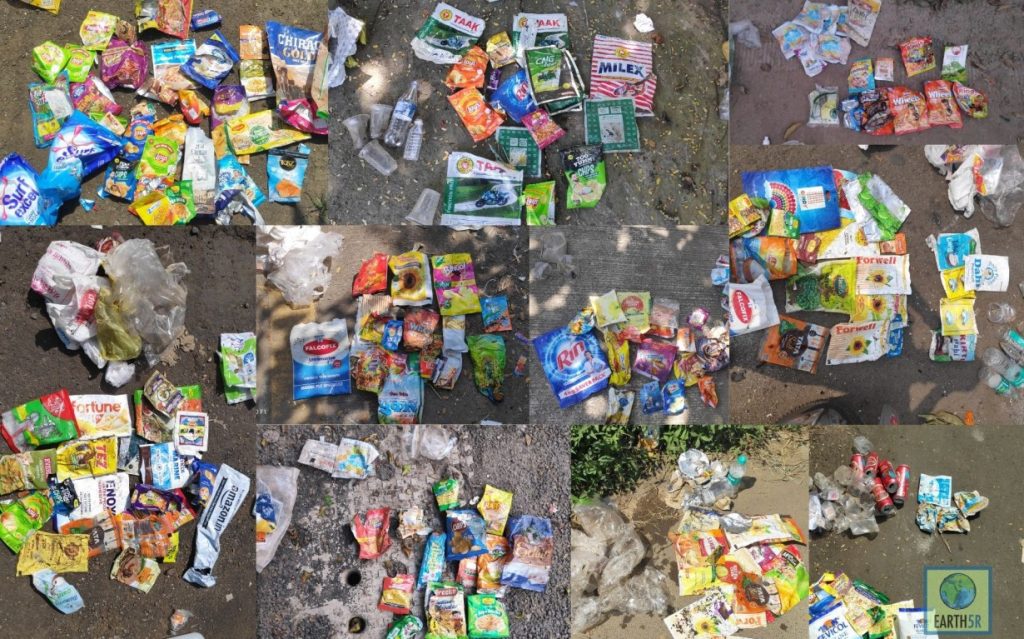
Tackling Plastic Waste At Thane With The ‘Know Your Plastics’ Project
To raise awareness on the poor management of plastic waste, Earth5R has recently launched a project known as the ‘KNOW YOUR PLASTICS’ project. As a result, Earth5R volunteers across the country are now implementing this project in their respective cities, towns and villages to create a meaningful impact not just in the country but also worldwide.
The data collected from this project is not just useful to the local municipalities and government bodies, but will also be shared with the United Nations Organization, Intergovernmental Agencies like OECD, IUCN, World Bank, Global Universities and other institutions to help with the implementation of the sustainable development goals.
Implementing The ‘Know Your Plastics’ Project
Cleanup and sampling of 10 different locations was conducted by Earth5R volunteer, Ruchit Kulkarni, at Thane city. As a resident of the city, he believes that, “Rather than merely talking about the environmental issue, we should take action and through this project I could contribute some useful data from my city as a citizen scientist”
Rather than merely talking about the environmental issue, we should take action and through this project I could contribute some useful data from my city as a citizen scientistRUCHIT KULKARNI, EARTH5R VOLUNTEER
Plastic Waste Data From Thane
The data he collected was analysed and this is what he found:
- Out of a total of 642 plastic waste items, polythene bags (LDPE) constituted the highest amount of waste
- This was followed by Multi-Layer Packaging (MLP) at 22.7%
- 82 Tetra-packs items were found which made up 12.8% of the waste collected
- 12.3% of the total waste was HDPE and 4.4% were PET Bottles
- Mobile covers, Cutleries, Thermocol and medical waste made up 1.2%, 1.2% and 1.1% of the waste collected respectively
When asked why he thinks this project is effective he states that, “The aim of this project is quite different as compared to all local projects initiated by resident people because such home-grown projects only aim at cleaning the area, rather than focusing on recycling or finding some permanent solution. I personally think cleaning up the area is not going to solve the global plastic crisis, because same amount of waste would accumulate again in that same area after a few days”
Waste Generation At Thane City
Thane city, which is known as the ‘City of Lakes’ since it is home to more than 30 lakes, has also often been dubbed as the ‘garbage city’ by its own residents because of the massive amount of plastic waste it generates.
- According to a report dated 2013, 92000kg of plastic waste was generated daily, most of which was dumped in water bodies like creeks and lakes resulting in clogging of the city drains.
- As per the reports, 11000kg of plastic waste was generated by grocery shops alone in the form of carry bags and other packing materials. Apart from this, 7,000 kg of milk pouches, oil cans; 9000kg of plastic containers used by cola and bottled water manufacturers and 10,000 kg of cosmetics packaging material contributed to the total plastic waste.
- Currently, the city produces 1039 tons of solid waste on a daily basis where 15 tons per day is the generation of domestic hazardous waste, while 10 tons per day comprises of sanitary waste
Ocean Damage Caused By Global Riverine Pollution
- As most of the waste is discarded into lakes, rivers and creeks, the ocean faces a direct threat. Polluting the ocean with plastics poses a threat not only to aquatic life, and ecosystems, but also affects human health.
- Land-based plastics are one of the main sources of marine plastic pollution. Pollution can be caused by direct emission from coastal zones or more importantly- by transport through rivers to the oceans.
- A study conducted between 2017 and 2020, examined more than 1,600 rivers worldwide which together make up 80 percent of the total inflow of plastic into the world’s oceans. The river Ulhas, which passes through the cities of Thane, Pune and Raigad in Maharashtra, India, revealed to be the third largest plastic-emitting river in the world with Asia contributing to the highest plastic emissions into the ocean at 81%.
Industrial pollution and the discarding of plastic waste must be tackled for the sake of all life in the ocean.”
– DAVID ATTENBOROUGH, BROADCASTER AND NATURAL HISTORIAN
- According to another recent study, out of the 100,887 outlets of rivers and streams observed globally, 31,904 locations emit plastic waste into the ocean.
- More than 1000 rivers account for 80 percent of global annual plastic emissions, which range between 0.8 million and 2.7 million metric tons per year.
- The Ganges River system has been identified as one of 14 continental rivers into which over a quarter of global waste is discarded. It is the second largest plastic polluting catchment in the world (0.12 million tonnes) after the Yangtze River in China.
- A study by Nature produced similar results which stated that, the top 20 polluting rivers were mostly located in Asia and accounted for more than two thirds (67%) of the global annual input.
More than 1000 rivers account for 80 percent of global annual plastic emissions, which range between 0.8 million and 2.7 million metric tons per year“
Addressing The Global Issue Of River Pollution At The Local Level
The Thane Municipal Corporation(TMC) recently encouraged public private partnerships by calling for applications that would help manage the waste produced by the city in terms of processing, recycling and reducing consumption as well as waste generation
Thane activists, however, said there is no improvement and that they can see garbage strewn at public places. According to an activist named, Chandrahas Tawade, “There are many initiatives, but all on paper. We are yet to see a satisfactory result”
The Role Of A Citizen Scientist
With skyrocketing plastic production, low levels of recycling, and poor waste management, between 4 and 12 million metric tons of plastic enter the ocean each year—enough to cover every foot of coastline on the planet! And that amount is projected to triple in the next 20 years.
Each and every citizen is needed to help save the planet. However, they cannot do it alone. Governments and private enterprises need to step up and equally share the responsibility of saving the earth. One of the reasons why Ruchit joined Earth5R was “to study and develop strategies to address the environmental catastrophe”
Similarly, global citizens can start making changes from their own homes by reducing consumption of single-use plastics, recycling their waste properly and spreading awareness on this issue.
However, this cannot be done in isolation. Those who hold more power such as the local municipal corporations, national governments, world organisations and private corporations must step up to help create a healthier and better environment for the future of the planet!
Reported by Ruchit Kulkarni and Edited by Krishangi Jasani



